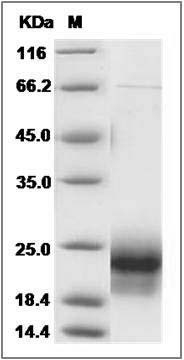-
Product Name
Mouse FIGF/VEGF-D (His Tag) recombinant protein
- Documents
-
Description
Vascular endothelial growth factor D (VEGF-D), also known as C-fos induced growth factor (FIGF), belongs to the platelet-derived growth factor/vascular endothelial growth factor (PDGF/VEGF) family. FIGF protein is active in angiogenesis, lymphangiogenesis, and endothelial cell growth. FIGF protein is secreted as a non-covelent homodimer in an antiparallel fashion. Human FIGF protein is expressed in adult lung, heart, muscle, and small intestine, and is most abundantly expressed in fetal lungs and skin. FIGF protein is structurally and functionally similar to VEGF-C. Therefore, FIGF protein binds and activates VEGFR-2 (Flk1) and VEGFR-3 (Flt4) receptors, and may particularly be involved in cancers, such as breast cancer, epithelial ovarian carcinoma and so on.
-
Protein name
Vascular endothelial growth factor D
-
Protein short names
AI325264; VEGF-D; RP23-202H24.2; VEGFD
-
Uniprot ID
P97946
-
Gene Name
Figf; Vegfd
-
Source/Expression Host
Human Cells
-
Expression Plasmid/cDNA
A DNA sequence encoding the mouse FIGF (P97946) (Phe98-Ser206) was expressed with a C-terminal polyhistidine tag.
-
Protein Species
Mouse
-
Molecular weight
The recombinant mouse FIGF comprises 120 amino acids and has a predicted molecular mass of 14 kDa. The apparent molecular mass of the protein is approximately 22 kDa in SDS-PAGE under reducing conditions due to glycosylation.
-
Purity
> 95 % as determined by SDS-PAGE
-
Activity
Measured by its ability to bind with mouse FLT4-Fc (Cat:502816) in a functional ELISA.
-
Validations

Mouse VEGF-D / VEGFD / FIGF Protein (His Tag) SDS-PAGE
Related Products / Services
Please note: All products are "FOR RESEARCH USE ONLY AND ARE NOT INTENDED FOR DIAGNOSTIC OR THERAPEUTIC USE"
